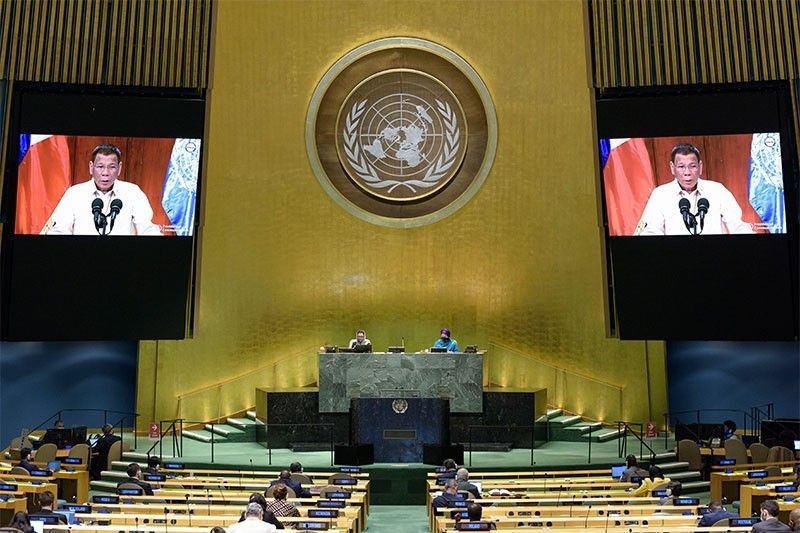Duterte raises South China Sea ruling to UN

Carpio, Del Rosario hail move
MANILA, Philippines — He promised to raise the issue at the right time.
Before the 75th session of the United Nations General Assembly in New York, President Duterte vowed to reject efforts to undermine the arbitral ruling that voided China’s expansive maritime claim in the South China Sea.
Accused by critics of selling out the Philippines’ rights in the disputed region in exchange for Chinese aid, Duterte said the ruling is already part of international law.
His pre-taped address – his first participation in the UN General Assembly – was played Tuesday at the UN headquarters in New York (early yesterday in Manila).
“We must remain mindful of our obligations and commitment to the charter of the United Nations and as amplified by the 1982 Manila Declaration on the Peaceful Settlement of International Disputes. The Philippines affirms that commitment in the South China Sea in accordance with (the United Nations Convention on the Law of the Sea or UNCLOS) and the 2016 arbitral award,” Duterte told the assembly, which included representatives from China, last Tuesday.
“The award is now… beyond compromise and beyond the reach of passing governments to dilute, diminish or abandon. We firmly reject attempts to undermine it,” he added.
In 2016, a Hague-based arbitral court ruled that China’s maritime claim, which covers about 90 percent of the resource-rich South China Sea, has no legal basis.
The ruling also affirmed the Philippines’ sovereign rights over its exclusive economic zone.
China has rejected the decision, calling it “illegal since day one.”
The landmark ruling stemmed from a case filed by the administration of former president Benigno Aquino III, which described China’s claim as “excessive” and “exaggerated.”
Duterte has agreed to set aside the maritime dispute to improve the Philippines’ ties with China, but has given assurances that he would not give up even an inch of the country’s territory to foreign powers.
His administration, however, has rejected calls to file new cases against China for violating its obligation under the UNCLOS to protect the marine environment.
Issues related to the South China Sea can be discussed through bilateral consultations with the Chinese government, officials have said.
Duterte said the arbitral award stood for “the triumph of reason over rashness.”
“We welcome the increasing number of states that have come in support of the award and what it stands for – the triumph of reason over rashness, of law over disorder, of amity over ambition. This – as it should – is the majesty of the law,” the President said.?Palace: China policy consistent
Presidential spokesman Harry Roque said Duterte has been consistent with his position on the South China Sea ruling.
“We have never changed our position on the arbitral ruling. I have said it over and over again that there is nothing that can undermine that decision, it is evidence of customary law,” Roque told CNN Philippines yesterday.
“The forum where he addressed, where he delivered his line is a multilateral forum, the United Nations, and it does not involve bilateral ties specifically with China. So the President simply restated the fact that the arbitral ruling is a part of international law,” he added.
Asked what compelled Duterte to bring up the ruling during the assembly, Roque replied: “Well, it’s the first time that the President spoke in the UNGA, so it’s the first time that the President was able to say what has been his consistent position all along. Perhaps, if he had delivered his speech in the UNGA earlier, then he would have said the same thing earlier.”
“The President is a lawyer, so he knows exactly the effect of that ruling. And again, nothing, nothing that any other country would do can ever change the fact that the international community has already accepted the fact that there is no legal basis for the historic claims being used by China in its claim for a big part of the South China Sea,” he added.
Even hostile acts like military occupation would not change the fact that the arbitral ruling is already recognized by international law, according to the Palace spokesman.
“That is why even in instances of military occupation, that will never have the effect of occupation, which is an element for acquisition of territory. It simply will not be recognized by international law,” he said.
“Even if they forcibly occupy all the disputed territories, that will have no effect as far as international law is concerned because military activities and even military occupation will never have any legal effect as far as title is concerned,” he added.
China has created artificial islands on Kagitingan (Fiery Cross), Panganiban (Mischief), Zamora (Subi), Burgos (Gaven), Kennan (Hughes), Mabini (Johnson South) and Calderon (Cuarteron) Reefs, areas located off Palawan province that are also being claimed by the Philippines.
Various sectors have expressed concern that China’s island-building would affect freedom of flight and navigation in the area.?‘Ties with China to move forward’
Roque clarified that the Philippines’ policy on China has not changed. He said the Philippines “would probably accept the fact that there will be no resolution in the near future as far as the territorial dispute is concerned.”
“If we cannot resolve territorial issues, then we can put it temporarily on hold and we will proceed with matters that we can move forward on, specifically trade and investment. It is not the sum total of our bilateral relations with China. But of course, it is important that the President restate a legal fact,” the Palace spokesman said.
“We are not setting (the ruling) aside. The thing is, you don’t set aside a legal fact... What we are saying is, for bilateral ties purposes, because we cannot resolve this territorial dispute, then we will not pursue the resolution of the territorial dispute, we will proceed with all other aspects of our bilateral relations,” he added.
Pressed how the Philippines could move forward from the issue, Roque said Duterte’s address in the assembly was “a perfect example of what we can do.”
“We can only rely on multilateralism right now, I don’t think we can even rely on unilateral use of force; not only is it prohibited under international law, but we also have limited means by way of that option and that has been stated by the President time and again,” Roque said.
‘Do not hate each other too much’
Duterte also warned the UNGA about the possible effects of geopolitical tensions that continue to rise while the world is grappling with the COVID-19 pandemic.
He said the tensions could inflict a “terrible toll” on human life and property if the “word war” between some countries deteriorates into a real war of nuclear weapons and missiles.
“Escalating tensions benefit no one. New flashpoints heighten fears and tend to tear peoples apart. When elephants fight, it is the grass that gets trampled flat,” the Philippine leader said.
“I therefore call on the stakeholders in the South China Sea, the Korean Peninsula, the Middle East and Africa: if we cannot be friends as yet, then in God’s name, let us not hate each other too much. I heard it once said, and I say it to myself in complete agreement,” he added.
‘Never a slave to China’
Duterte was never an “alipin” (slave) to China, Foreign Affairs Secretary Teodoro Locsin Jr. said yesterday.
Locsin was reacting to the “Alipin no more!” tweet by Sen. Panfilo Lacson after the President invoked the arbitral award in an address to world leaders gathered at the UNGA annual debate.
“He never was. He was alipin to the reality he inherited: a China already in possession of our reef, thanks to Obama giving it to China when our navy and the Chinese navy had a standoff, and the US told both to stand down and leave. We left, China stayed and reclaimed it,” Locsin tweeted.
In a post on Twitter, Lacson welcomed Duterte’s move.
“Alipin no more! Hearing the President invoke the award before the UN General Assembly while firmly rejecting any attempt to undermine it should now erase doubts on where he stands regarding the WPS issue,” Lacson said.
Deeply thankful
Former foreign affairs secretary Albert del Rosario yesterday welcomed Duterte’s invocation of the Philippines’ 2016 arbitral victory over China in the South China Sea dispute at the UNGA.
“This is the first time that our President addressed the UNGA and we are heartened to know that he is not at all impervious, but listens to the will of his countrymen,” Del Rosario said in a statement.
“We deeply thank you, Mr. President, for defending what is ours,” he said.
Del Rosario also welcomed Duterte’s statement that he supports the “increasing number of states that have come in support of the award,” which include the United States, France, Germany, United Kingdom and Australia.
Former Supreme Court associate justice Antonio Carpio yesterday praised Duterte for showing a strong stand before the UNGA and asserting the Philippines’ victory at the arbitral tribunal over China’s claims in the West Philippine Sea (South China Sea).
“I personally commend the strong stand that President Duterte made before the UN General Assembly that the arbitral award in the South China Sea Arbitration is ‘beyond compromise and beyond the reach of passing governments to dilute, diminish or abandon,’” Carpio said in a statement.
He also commended Duterte for giving recognition to the countries that have expressed their support for the Philippines’ victory in The Hague.
Senators also commended Duterte for his address before the UNGA and for defending the anti-terrorism law.
Senate President Pro Tempore Ralph Recto said if there was an Emmy for the UNGA speeches, the one that Duterte delivered could win the prize for the best written one. — Pia Lee-Brago, Evelyn Macairan, Paolo Romero, Cecille Suerte Felipe, Delon Porcalla
Related video:
- Latest
- Trending





























